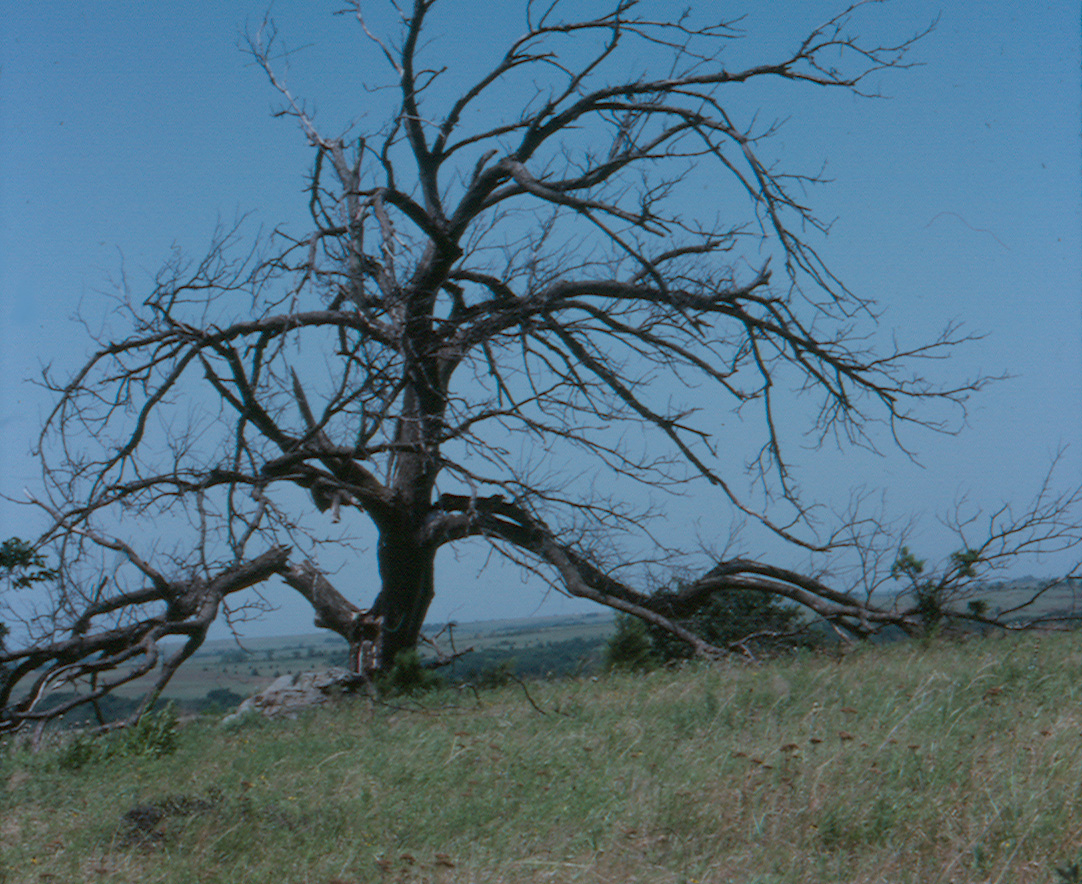Resource Library
Plant of the Week: Trees
Trees — This now-dead elm was the tree that moved me as a youth to love trees and gain a perspective on the larger world that awaited me as I grew up.
(Image courtesy Gerald Klingaman)
Download High Resolution
I once heard a musician say that if you could just write one good song in your life, you would be remembered. The larger truth is probably that if each of us can do just one good thing, we will not have wasted our time on earth and someone, somewhere will remember.
While the concept of “universal knowledge” is ever-changing, most populations have touchstones that resonate to create what we call popular culture. Joyce Kilmer’s poem Trees is one of these bits of popular culture that almost everyone of my generation remembers:
I think that I shall never see
A poem lovely as a tree.
I don’t know if children today are taught Kilmer’s simple, straightforward sentimental poem or if it has been relegated to the dustbin of history. Poetry itself is probably on the hit list of many who would lead us to believe there are more important things to learn than snippets of rhyme in this age of standardized tests and politicized education. As a society we are lessened if some of this softer, foundational underpinning is deleted from the educational process.
Memory fails as to when I was first introduced to the Kilmer poem. But from the beginning it resonated with me, for in six short couplets it painted an image that was easy to understand and spoke to my awakening interest in the natural world. Critics, most of whom have never written anything for which to be remembered, dismiss his poem as sentimental drivel but they overlook the power of simple things to move feelings.
Joyce Kilmer (1886-1918) first published the poem in a literary magazine in 1913 and in book form a year later. This single poem cemented his credentials as a poet and is the one thing for which he is remembered. He has been dubbed the last of the romantic poets.
Kilmer lived in New Jersey where he worked as a journalist and editor and, after the success of Trees, as a lecturer. He was especially popular in Catholic circles where he combined his theology with reverence for nature. In April 1917, just a few days after the U.S. entered World War I, Kilmer enlisted in the Army. This was just a few weeks after burying his 5-year-old daughter and days after the birth of his fifth child. In France he sought out more dangerous work, eventually transferring to the military intelligence unit where he was assigned forward scouting duty. A sniper’s bullet to the head ended his life on July 30, 1918.
Several cities and institutions claim to know the specific tree that inspired Kilmer to write his now famous poem. According to his son, however, it was a reverence for all trees that fueled his imagination, rather than any specific tree. One hundred years after the poem first appeared, I’m glad it was not related to a specific tree, because that frees each of us to think of the poem as describing that one tree that is special in our own lives.
In this time of genetic engineering, artificial intelligence and space probes to the far reaches of the universe, I think it is good to reflect on the last couplet of Kilmer’s little poem:
Poems are made by fools like me,
But only God can make a tree.
Our overabundance of confidence and hubris have brought us far in this age of high technology, but we likewise have a tendency to ignore inconvenient truths – things such as global warming – that might yet help us understand that we are a part of nature, not its master.
For more information about horticulture contact your county extension agent.
Pursuant to 7 CFR § 15.3, the University of Arkansas System Division of Agriculture offers all its Extension and Research programs and services (including employment) without regard to race, color, sex, national origin, religion, age, disability, marital or veteran status, genetic information, sexual preference, pregnancy or any other legally protected status, and is an equal opportunity institution.
